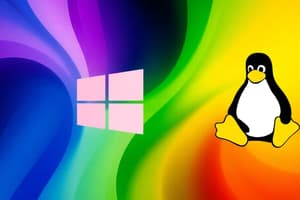Podcast
Questions and Answers
Which of the following operating systems is exclusively for Apple devices?
Which of the following operating systems is exclusively for Apple devices?
- Mac OS (correct)
- Linux OS
- Windows OS
- Android OS
What is the most widely used mobile operating system?
What is the most widely used mobile operating system?
- Android OS (correct)
- Unix
- Windows OS
- iOS
Which operating system is open-source and popular among developers?
Which operating system is open-source and popular among developers?
- iOS
- Chrome OS
- Linux OS (correct)
- Solaris
What is a processor also known as?
What is a processor also known as?
A process in the ____ state is currently being executed by the CPU.
A process in the ____ state is currently being executed by the CPU.
What are the two types of termination for a process?
What are the two types of termination for a process?
What is the smallest unit of execution within a process?
What is the smallest unit of execution within a process?
Which type of scheduler is responsible for deciding which process gets to run next from the ready queue?
Which type of scheduler is responsible for deciding which process gets to run next from the ready queue?
Flashcards are hidden until you start studying
Study Notes
Operating Systems
- Windows OS is user-friendly and compatible with various software; popular versions include Windows 10 and Windows 11.
- Mac OS is designed for Apple devices, known for its sleek design, high security, and Apple product integration; examples include macOS Monterey and macOS Ventura.
- Linux OS is open-source, customizable, and secure; popular distributions include Ubuntu, Fedora, and Debian.
- Android OS is the most widely used mobile operating system, open-source, and with a vast app ecosystem; examples include Android 12 and Android 13.
- iOS is secure and high-performance, used exclusively on Apple mobile devices; versions include iOS 15 and iOS 16.
- Unix is a multi-user, multitasking operating system known for its security and stability; widely used in research and enterprise environments.
- Chrome OS is lightweight and cloud-centric, designed for Chromebooks, focusing on web-based applications and simplicity.
- Solaris is an enterprise-class operating system known for scalability, security, and performance in high-end servers.
- Fedora is a Linux-based operating system favored by developers and system administrators for its focus on open-source software, cutting-edge features, and robust security.
- Embedded Linux is a version of Linux used in embedded systems like smart TVs, routers, and IoT devices.
Processor
- The brain of a computer, also known as the Central Processing Unit (CPU).
- Carries out instructions from programs and performs calculations.
- Processes data and controls other computer components.
- Handles basic arithmetic, logic, input/output (I/O), and control operations.
Process State
- New: Process is being created
- Ready: Process is ready to run and waiting for CPU time.
- Running: Process is currently being executed by the CPU.
- Waiting (Blocked): Process is waiting for an event to complete (like I/O operations).
- Terminated: Process has finished execution.
Process Creation and Termination
- Process can terminate normally (completing execution) or abnormally (error or external intervention).
- OS deallocates resources associated with the process after termination.
- Process creation can occur when:
- A user starts a program
- An existing process creates a new process
- The OS needs to create a system process
Process Threads
- Smallest unit of execution within a process.
- A process can have one or more threads (multithreading) for specific tasks.
- Each thread executes independently but shares the same memory space with other threads in the process.
- Threads within a process share resources like memory but have separate stacks and program counters.
- Single-threaded processes have one thread executing one task at a time.
- Multi-threaded processes have multiple threads within the same process, enabling parallelism and efficient CPU usage.
Process Scheduler
- Decides which process or thread runs on the CPU at any given time.
- Types of Schedulers:
- Long-Term Scheduler (Job Scheduler): Determines which processes are admitted into the ready queue. Controls the degree of multiprogramming (number of processes in memory).
- Short-Term Scheduler (CPU Scheduler): Selects the next process from the ready queue to run on the CPU; done frequently as processes run in short bursts.
- Medium-Term Scheduler: Temporarily removes processes from memory.
Studying That Suits You
Use AI to generate personalized quizzes and flashcards to suit your learning preferences.




